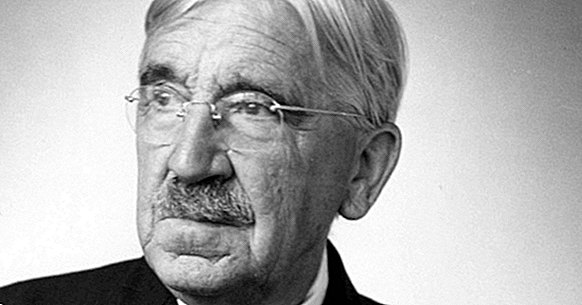The functionalist theory of John Dewey
There are multiple theories and approaches existing within psychology. Throughout history, different ways of seeing and studying the human mind have been born and disappeared . Initially the concern of the students of the psyche was to study what is and how the mind is configured, looking for its core elements and basic structure.
However, apart from this approach called structuralism, another appeared in which the main concern was to investigate not so much what or what it was, but what it is for and what functions it has. We are talking about the functionalist theory of John Dewey .
- Related article: "History of Psychology: authors and main theories"
What is functionalism in psychology?
In the field of psychology, functionalism is a current of thought or approach that proposes the need for study psychic phenomena from the functions they perform, and not from their structure . Instead of how, it focuses on what different psychic functions are for. This movement has as its main object of study consciousness as an act, and asks what we do and why.
It is considered that the main purpose of the mind is to adapt the internal structure to the environment . At this point we can observe a strong influence of evolutionary theories, which together with the pragmatism of the time would end up configuring this current of thought. This comes from the hand of a great interest in the effects of the environment on the psyche and the evolution of man. It is based on the idea that behavior can not be explained as an automatic response to a stimulus, the mind being a complex system in which different processes and interrelated states occur.
One of its main characteristics the use of non-introspective methodology to study objectively the conscience and the rest of psychic phenomena, accepting any methodology as long as it has useful results. But nevertheless, the experimental introspection that used to be used from the structuralist perspective was rejected as it is considered to be not very valid and natural (although William James will defend the use of introspection without training).
This approach to the study of the psyche would end up using association as the main way to explain complex behavior. This suggests later schools of thought such as behaviorism , of which functionalism is in fact precursor. And it is that functionalism would end up being integrated into different schools and serving as a precursor to the development of different theoretical models, such as the aforementioned behaviorism or the psychology of Gestalt.
The functionalists would be pioneers in the study of learning , and it would be from them that the first mental tests would begin to appear (appearing with Cattell). Also individual differences and the study of psychopathology would be driven by this current of thought.
The origin of functionalism: William James
William James is considered the founding father of functionalism , although he never considered himself as such and rejected the separation of psychology in schools of thought. This author considers that the main objective or function of the conscience is to choose behavior in a way that allows us to survive and adapt as best as possible.
Consciousness is a phenomenon that emerges from action : we are continuously making associations, changing the focus of attention and performing different mental operations in a flow that can not be stopped.
The main focus of interest of William James was the modulation of this in an adaptive way in different contexts, interesting and investigating profusely aspects such as the formation of habits. He believed that psychology should focus on day-to-day experiences instead of focusing on abstract phenomena and constructs (which are still products of the mind).
In addition, this researcher considered it difficult to observe psychic alterations that were not directly observable by conduct or physiological change, and that the psyche and the processes that we carry out have an evolutionary sense that allows survival or else they would have disappeared.
I would also observe and take into account the emotions within the mental processes, as well as the existence of reflex arcs before emotional stimuli. Conceived emotion as a consequence of an automatic reaction , appearing first the physical reaction and then the emotional reaction.
- Related article: "William James: life and work of the father of Psychology in America"
John Dewey and his functionalist theory
John Dewey is another of the great founding fathers of psychological functionalism . This important psychologist would coincide and start working together with one of William James' disciples, James Angell (who greatly expanded functionalism in different areas), and would be one of the main promoters of the use of pragmatism and the functionalist approach in the educational field. In fact, together they would make the University of Chicago the center of the functionalist school.
This author considered education and learning as key elements for human beings and their development, being very involved in the achievement of social changes.
Dewey worked and analyzed in some of his most important works aspects such as the reflex arc , arriving at the conclusion that the traditional structuralist vision that is based on dividing it into independent fragments such as sensation, idea and action was not able to explain the phenomenon, being useful only as a mere description. From a pragmatic and functional point of view John Dewey considered the need to understand this arch as a whole, more than the simple sum of the parts.
He advocated a molar and dynamic approach, in which behavior should be taken into account as it worked rather than establishing random divisions and the fact that it evolves and varies over time. And is that if you look at the whole you can see the biological and adaptive role of the physical reaction. He also considers, like James in his vision of the functioning of emotional reactions, that the behavior is what allows to give meaning to the sensations .
Taken to the world of education, proposes that this type of separation into differentiated parts is what generates school failure , by not allowing the representation of a whole that integrates all the information. Simple memorization is not functional or useful, since it does not have a sense that allows survival. He advocated a change in education that had the stimulation of thought and exploration, versatility and activity. He also advocated inclusion.
For a large part of his career had an influential role in the psychology of education and psychopedagogy . In fact, he would come to advise the governments of countries such as China and Russia.
- Maybe you're interested: "The 5 differences between a psychologist and an educational psychologist"
The contrast with structuralism
The main ideas of functionalism emerged at a time when the predominant position was mainly structuralist, arising as a reaction to it. Functionalism proposed that instead of analyzing the what and how is the psyche should be studied the function or sense that has the psyche and mental processes.
Titchener, main founder of the structuralist school , intended to study the human mind from the basic elements or "atoms" that make it up. However, functionalism considered that there are no such elements, the psyche being something fluid and dynamic that can not be divided or stopped.
In addition, from the structuralism the conscience would be understood as conformed by different types phenomena: sensations, affections and ideas. Functionalism considers that this division does not allow taking into account the totality of consciousness as it is and therefore does not allow a valid explanation of the phenomenon, as it happened in the case of the reflex arc with Dewey.
Likewise, while structuralism had an essentially theoretical approach, the functionalist theory of John Dewey and other researchers close to his perspective was more focused on analyzing and giving a practical answer to the events that occur on a daily basis.
- Maybe you're interested: "Edward Titchener and structuralist psychology"
Bibliographic references:
- García, L .; Moya, J. & Rodríguez, S. (1992). History of Psychology. (Vols. I-III). 21st Century: Madrid.
- Hothersall, D. (2004). History of psychology. New York: McGraw-Hill.



















